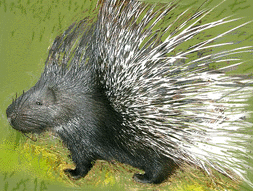...Best of Sicily presents... Best of Sicily Magazine. ... Dedicated to Sicilian art, culture, history, people, places and all things Sicilian. |
by Vincenzo Mormino | ||
Magazine Index Best of Sicily Arts & Culture Fashion Food & Wine History & Society About Us Travel Faqs Contact Map of Sicily |
It is dark brown, grey and black, growing to a length of 70 centimeters and weighing as much as 15 kilograms. It should not be confused with the hedgehog, a superficially similar but smaller rodent. Porcupines are night creatures; daytime sightings are rare. they enjoy bushy areas, and in Sicily prefer terrain lower than one thousand meters high, where it rarely snows. Porcupines (istice is the Italian word) appear to have few natural enemies (if man is excluded). The porcupine does not shoot its quills (spines) as folklore suggests. When menaced, it often chooses to flee, though porcupines can bite or claw adversaries, and may even charge backward, attempting to stab with their quills. The porcupine is generally considered the largest rodent present in Italy, where hares are also seen. The crested porcupine lives in holes it burrows. It rarely attempts to climb trees but can swim. In winter, which is brief and not very cold in the parts of Sicily inhabited by porcupines, these creatures remain in their holes but do not actually hibernate. They consume bark, tubers, roots, berries and domestic crops, and have been known to hone their teeth by gnawing on bones. Old World porcupines live up to fifteen years. Since 1974, they are protected by Italian law. There is a theory that the crested porcupine was introduced into Europe by the Romans, and it is sometimes called the "North African" crested porcupine. In Sicily, however, a number of mammals of African origin are present, and appear to occur naturally. Porcupines live in pairs and females bear one litter of one or two young per year. Considered solitary creatures, they are occasionally seen in families or pairs. About the Author: Vincenzo Mormino has written about wildlife and nature for Best of Sicily and hard-copy publications. | |
Top of Page |
 The common Old World crested porcupine (hystrix cristata), the same species present in northern Africa as far south
as Ethiopia, is rare but not extinct in Sicily. What is amazing is the fact
that it survives at all, the island's ecosystem having been largely compromised
in the last century or so, and has been sighted in unlikely places like
the Favorita Park (formerly a royal hunting ground) outside Palermo.
The common Old World crested porcupine (hystrix cristata), the same species present in northern Africa as far south
as Ethiopia, is rare but not extinct in Sicily. What is amazing is the fact
that it survives at all, the island's ecosystem having been largely compromised
in the last century or so, and has been sighted in unlikely places like
the Favorita Park (formerly a royal hunting ground) outside Palermo.